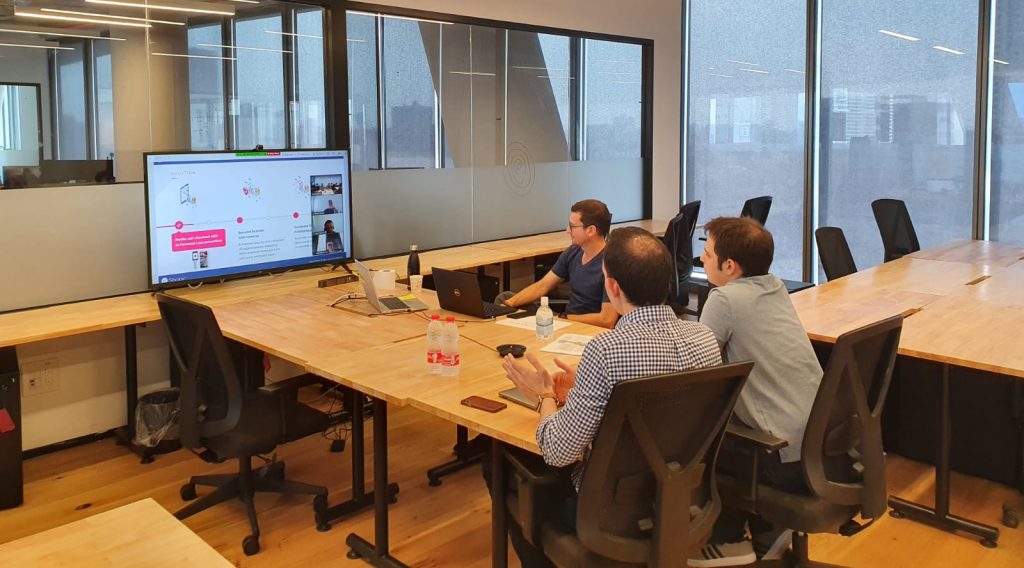Intel’s startup growth program Ignite announced this week that 10 new Israeli startups were selected – following a virtual process – for its second cohort, scheduled to begin April 19.
The 12-week program will be conducted entirely online until people can safely return to work amid the coronavirus pandemic, the program said. This will include matching each startup with an industry mentor and conducting weekly Zoom meetings, online workshops on sales, governance, go-to-market strategies, and storytelling, as well as “culture forming” sit-downs with the Intel Ignite team, progress meetings, VC introductions and weekly founder circle sessions.
The 10 startups were selected from over 200 applicants. Seventy were interviewed and 16 were chosen to move on to the selection round. Due to the pandemic, that round was conducted virtually with the 16 companies interviewed via Zoom by more than 50 Intel executives, and top VCs and entrepreneurs, Intel Ignite said.
The accelerator further indicated that due to the circumstances, it will be increasing the number of entrepreneurs to speak to the startups about how to best survive challenging economic situations, specifically entrepreneurs who survived both the 2000 and 2008 downturns. These entrepreneurs will speak to the startups from both Intel Ignite’s first and second cohort about crisis management and their takeaways for how to successfully manage and build companies.
Intel Ignite first launched last June to tap into high impact, data-centric technology and selected nine startups for its first cycle announced in October.
The second cohort consists of a diverse set of seed startups, each with an average funding of more than $5 million, according to the program.
They are:
- Aspecto, a Tel Aviv-based startup that created a development efficiency platform to eliminate the need for quality assurance, reduce production issues, and increase R&D productivity. The company’s approach is complete automation, based on real production data.
- Chain Reaction, which builds cloud-based hardware infrastructure that will enable enterprise-grade privacy enabled blockchain systems.
- ClassiQ, a startup that tackles complex challenges in quantum computing development, bridging the gap between complex quantum logic and real-world applications.
- Compira Labs, which leverages machine learning for better quality video streaming. The technology is used by content distribution networks and video providers.
- Deepchecks a startup founded by data scientists that to monitor the health and performance if AI systems.
- Hyro, a Tel Aviv-based startup founded in 2018 that creates plug & play conversational AI assistants for enterprises. It allows them to add voice or chat capabilities to their websites and mobile apps without the use of any integrations, playbooks or training data from customers.
- Indoor Robotics, a Ramat Gan-based startup that developed an autonomous platform for the navigation and operation of robots indoors. Founded in 2018, the company’s first product is the Tando, an AI-powered patrol drone for use in indoor spaces.
- OneView, another Tel Aviv-based startup that allows for scalable, efficient analysis of satellite imagery by utilizing virtual synthetic data, optimized for machine learning algorithm training. Satellite data has become much more available and of better resolution, but traditional machine learning methods are not sufficient in fully utilizing it.
- Shopic, an Israeli startup founded in 2015 that created the world’s first Frictionless Checkout platform using AI, which fits medium- and large-format grocery stores. It allows customers to check out their purchases from their mobile devices and collects advanced analytics for retailers. It also provides information on stock levels, missing items and so on. The company also has an office in NY.
- Valid Network, a cybersecurity company that blends traditional application security into the world of dApps (decentralized applications) oftware development. Its proprietary technology includes utilization of advanced machine learning algorithms and code verification techniques.
“We are very excited to have such an incredible group of startups participating in our second cohort,” said Tzahi (Zack) Weisfeld, General Manager of Intel Ignite, in a statement.
“These are new and challenging times for startups. The easiest path is not to do anything and wait for coronavirus to pass. The more responsible thing to do is to realize there is a new reality and probably a new norm. The faster we adapt and help startups, the faster we can help them overcome their challenges. As funding is being suspended and startups are in real need for experienced advice and help – this is our time to do everything we can to help,” he noted.
Related posts

Israeli AI Safety Tool Among TIME’S Best Inventions For 2024

Editors’ & Readers’ Choice: 10 Favorite NoCamels Articles

TAU Team Discovers Mechanism To Eliminate Cancerous Tumors




Facebook comments